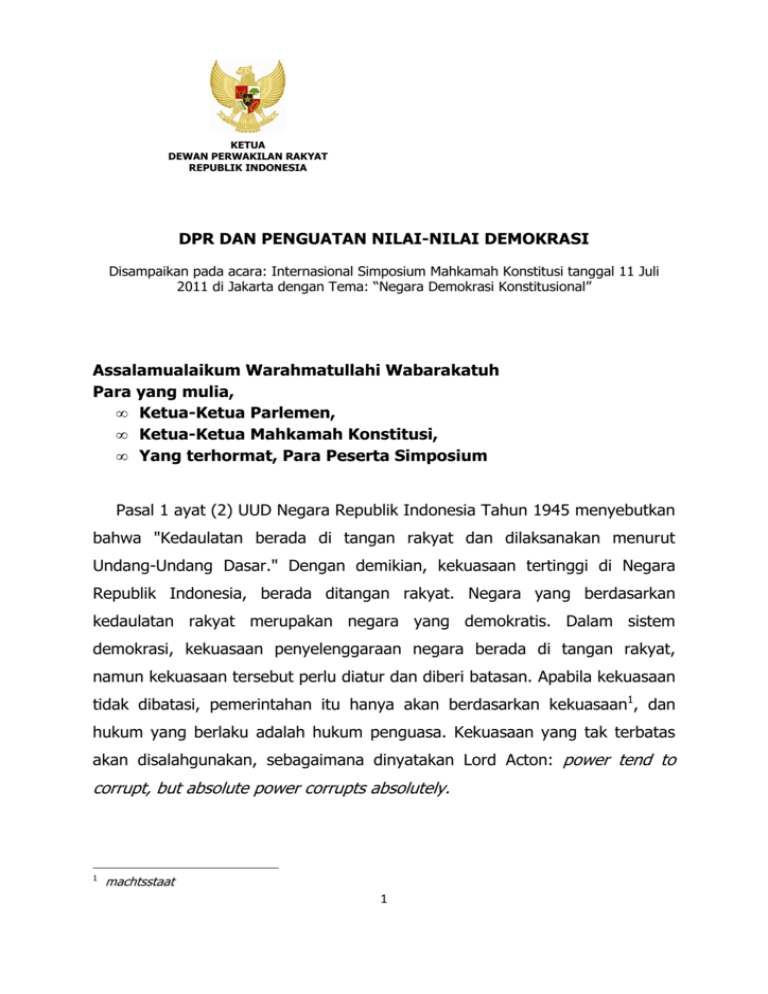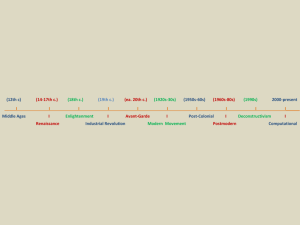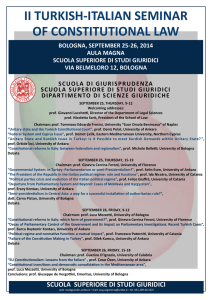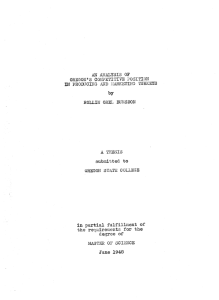- Marzuki Alie
advertisement

KETUA DEWAN PERWAKILAN RAKYAT REPUBLIK INDONESIA DPR DAN PENGUATAN NILAI-NILAI DEMOKRASI Disampaikan pada acara: Internasional Simposium Mahkamah Konstitusi tanggal 11 Juli 2011 di Jakarta dengan Tema: “Negara Demokrasi Konstitusional” Assalamualaikum Warahmatullahi Wabarakatuh Para yang mulia, • Ketua-Ketua Parlemen, • Ketua-Ketua Mahkamah Konstitusi, • Yang terhormat, Para Peserta Simposium Pasal 1 ayat (2) UUD Negara Republik Indonesia Tahun 1945 menyebutkan bahwa "Kedaulatan berada di tangan rakyat dan dilaksanakan menurut Undang-Undang Dasar." Dengan demikian, kekuasaan tertinggi di Negara Republik Indonesia, berada ditangan rakyat. Negara yang berdasarkan kedaulatan rakyat merupakan negara yang demokratis. Dalam sistem demokrasi, kekuasaan penyelenggaraan negara berada di tangan rakyat, namun kekuasaan tersebut perlu diatur dan diberi batasan. Apabila kekuasaan tidak dibatasi, pemerintahan itu hanya akan berdasarkan kekuasaan1, dan hukum yang berlaku adalah hukum penguasa. Kekuasaan yang tak terbatas akan disalahgunakan, sebagaimana dinyatakan Lord Acton: power tend to corrupt, but absolute power corrupts absolutely. 1 machtsstaat 1 Gagasan untuk membatasi kekuasaan dalam penyelenggaraan negara itulah yang dinamakan demokrasi konstitusional. Ciri-cirinya adalah pemerintahan yang terbatas kekuasaannya, dan tidak dibenarkan bertindak sewenang-wenang terhadap warga negaranya. Pembatasan atas kekuasaan pemerintahan tercantum dalam konstitusi, sehingga sering disebut sebagai pemerintahan berdasarkan konstitusi2. Dalam negara demokrasi konstitusional, kekuasaan dibagi kepada lembaga-lembaga negara sesuai dengan fungsinya. Pembagian kekuasaan ini dilakukan demi menghindari penyalahgunaan kekuasaan itu sendiri. Adanya pembatasan kekuasaan oleh konstitusi, menyebabkan kekuasaan penyelenggaraan pemerintahan tidak bertumpu pada satu orang atau satu badan. Berdasarkan hal ini, maka muncul berbagai konsep tentang pembagian kekuasaan, antara lain paham trias politica. Trias politica memandang bahwa kekuasaan negara terdiri dari tiga macam kekuasaan yaitu kekuasaan legislatif, kekuasaan eksekutif, dan kekuasaan yudikatif. Kekuasaan legislatif merupakan kekuasaan membentuk undangundang. Kekuasaan eksekutif merupakan kekuasaan melaksanakan undangundang. Kekuasaan yudikatif merupakan kekuasaan mengadili atas nama undang-undang. Di Indonesia, empat kali amandemen UUD 1945 sejak tahun 1999 hingga 2002, telah menghasilkan struktur kelembagaan negara yang sedikit berbeda dengan struktur kelembagaan negara sebelumnya. Di samping DPR, ada DPD yang dipilih langsung oleh rakyat. Pasca amandemen, juga hadir lembaga tinggi negara yang baru yaitu Mahkamah Konstitusi. Perubahan struktur kelembagaan negara tersebut secara tidak langsung diiringi dengan redefinisi fungsi dari masing-masing lembaga negara. 2 constitutional government atau restrained government 2 Kekuasaan eksekutif dipegang oleh Presiden3, kekuasaan legislatif dipegang oleh DPR4 dan DPD5, sedangkan kekuasaan kehakiman dipegang oleh Mahkamah Agung dan badan peradilan yang berada dibawahnya, serta Mahkamah Konstitusi6. Yang kami muliakan Ketua Ketua Parlemen dan Ketua MK, Indonesia adalah negara demokrasi ke-3 terbesar di dunia. Hal ini ditandai dengan proses demokrasi yang telah berjalan sejak era reformasi tahun 1998. Pemilu langsung, untuk memilih anggota anggota lembaga perwakilan, Presiden dan Wakil Presiden, dan Kepala Daerah, telah berjalan. Namun demikian kita menyadari, bahwa demokrasi yang telah berjalan, bukan tanpa kelemahan. Demokrasi harus dijalankan dalam kerangka dan koridor hukum. Hukum dibentuk tidak dimaknai sebagai perintah penguasa, melainkan sebagai manifestasi kehendak rakyat. Para Peserta Simposium yang kami hormati, DPR memiliki 3 fungsi utama, yaitu fungsi legislasi, fungsi anggaran dan fungsi pengawasan7. Fungsi legislasi dilaksanakan sebagai perwujudan DPR selaku pemegang kekuasaan membentuk undang-undang8. Kekuasaan DPR membentuk UU dilakukan bersama dengan Presiden, sebagaimana dirumuskan pada Pasal 20 ayat (2) UUD Tahun 19459. Ketentuan mengenai 3 Pasal 4 ayat (1) UUD Tahun 1945 Pasal 20 ayat (1) UUD Tahun 1945 5 Pasal 22D ayat (1) UUD Tahun 1945 6 Pasal 24 ayat (2) UUD Tahun 1945 7 Sesuai Pasal 20A ayat (1) UUD 1945 8 Sebagaimana diatur pada Pasal 20 ayat (1) UUD Tahun 1945 yang berbunyi "Dewan Perwakilan Rakyat memegang kekuasaan membentuk undang-undang". 9 Yang berbunyi "Setiap rancangan undang-undang dibahas oleh Dewan Perwakilan Rakyat dan Presiden untuk mendapat persetujuan bersama". 4 3 persetujuan bersama dalam pembahasan sebuah rancangan undang-undang memberi arti, bahwa kekuasaan DPR dalam pembentukan UU, tidak tak terbatas. Sebagai lembaga pemegang kekuasaan membentuk UU, DPR harus memperhatikan UUD 1945 dan peraturan perundang-undangan lainnya. UU No. 10 Tahun 2004 mengatur bahwa materi muatan yang harus diatur dengan UU berisi hal-hal yang mengatur lebih lanjut ketentuan UUD 1945. Ketentuan yang ada pada UUD 1945 meliputi hak-hak asasi manusia, hak dan kewajiban warga negara, pelaksanaan dan penegakan kedaulatan negara serta pembagian kekuasaan negara, wilayah negara dan pembagian daerah, kewarganegaraan dan kependudukan, keuangan negara; atau berisi hal-hal yang diperintahkan oleh suatu UU untuk diatur dengan UU. Proses pelaksanaan legislasi yang di jalankan oleh DPR sebagai lembaga legislatif dan Presiden sebagai lembaga eksekutif, harus dalam koridor demokrasi dan berorientasi pada konstitusi, baik dalam aspek prosedur maupun dalam substansi. Namun perlu dipahami, sesuai dengan peraturan perundang-undangan Indonesia, produk UU yang di hasilkan juga di mungkinkan untuk dilakukan Judicial Review oleh Mahkamah Konstitusi, agar tidak bertentangan dengan konstitusi RI. Para Peserta Simposium yang kami hormati, DPR juga memiliki fungsi untuk menetapkan anggaran /APBN dan melaksanakan fungsi pengawasan. Tugas dan wewenang DPR dalam menjalankan fungsi anggaran adalah membahas RUU tentang APBN yang diajukan Presiden, dan memberikan persetujuan atau tidak memberikan persetujuan, dengan memperhatikan pertimbangan DPD. 4 Sedangkan tugas dan wewenang DPR dalam menjalankan fungsi pengawasan, yaitu melakukan pengawasan terhadap pelaksanaan UU dan APBN. Pelaksanaan fungsi pengawasan DPR terhadap lembaga eksekutif dilakukan dalam kerangka mekanisme check and balances, sesuai tatanan yang diatur oleh peraturan perundang-undangan. Para yang mulia dan hadirin yang berbahagia, Penguatan nilai-nilai demokrasi dalam pelaksanaan tiga fungsi DPR, dilakukan dengan cara membuka ruang partisipasi publik. Keterlibatan publik sangat penting, baik didalam proses pembentukan peraturan perundangundangan, proses pembahasan anggaran, maupun pelaksanaan fungsi pengawasan. Partisipasi publik dalam pelaksanaan ketiga fungsi DPR harus dipandang sebagai suatu proses interaksi, relasi dan kebersamaan yang melibatkan berbagai pihak yang meliputi unsur-unsur pemerintah pusat maupun daerah, lembaga suprastruktur, infrastruktur, lembaga sosial masyarakat, akademisi, organisasi profesional, organisasi kemasyarakatan, dan masyarakat lainnya selaku pemangku kepentingan. DPR menyadari bahwa partisipasi publik sangat diperlukan, dengan maksud untuk memberikan masukan kepada DPR10, meningkatkan kesiapan masyarakat untuk menerima suatu keputusan11, membantu perlindungan hukum12 dan mendemokratisasikan proses pengambilan keputusan13. Dengan adanya partisipasi publik, maka secara tidak langsung akan meningkatkan efektivitas keberlakuan suatu peraturan perundang-undangan di masyarakat 10 informing the administration increasing the readiness of the public to accept decisions 12 supplementing judicial protection 13 democratizing decision-making 5 11 dan memberikan legitimasi atau dukungan politik terhadap pembentukan suatu peraturan perundang-undangan. Para yang mulia dan hadirin sekalian, Untuk memenuhi amanat amandemen ke-3 UUD 45, DPR membentuk UU tentang Mahkamah Konstitusi. Lembaga ini adalah lembaga baru dalam stuktur kenegaraan yang di tuangkan di dalam UU No 24 tahun 2003. Mahkamah Kontitusi dibentuk untuk memberikan perlindungan terhadap hak-hak konstitusional warga negara dan semangat penegakan konstitusi, sebagai norma dasar, yang berarti segala peraturan perundang-undangan yang berada di bawahnya tidak boleh bertentangan dengan apa yang sudah diatur dalam konstitusi. Secara sederhana, fungsi dan peran Mahkamah Kontitusi adalah menjaga konstitusi guna tegaknya prinsip konstitusionalitas hukum. UU tentang Mahkama Konstitusi baru saja direvisi kembali oleh DPR, agar lembaga ini lebih optimal dalam melaksanakan tugas. Para yang mulia dan Hadirin yang berbahagia. Sebagai akir dari uraian tersebut dapat kami simpulkan: Pertama, DPR sebagai lembaga demokrasi terus-menerus berupaya untuk memperkuat nilainilai demokrasi di Indonesia. Upaya memperkuat nila-nilai demokrasi, dilakukan dengan memelihara nilai-nilai demokrasi itu sendiri dalam pelaksanaan setiap fungsi DPR. Kritik masyarakat terhadap kinerja DPR juga dipandang sebagai upaya bersama untuk memperkuat nilai-nilai demokrasi. Kedua, DPR memandang Mahkamah Konstitusi sebagai lembaga tinggi negara yang baru dibentuk atas dasar perubahan UUD 1945, merupakan mitra penguat nilai-nilai demokrasi. Oleh karena itu, hubungan DPR dan Mahkamah Konstitusi haruslah berada dalam posisi saling kontrol dan 6 penyeimbang (check and balances), dalam bidang peraturan perundangan. Dengan hubungan yang baik antar lembaga, penguatan nilai-nilai demokrasi akan semakin dapat dirasakan oleh publik. Nilai-nilai demokrasi tidak lagi menjadi slogan, tetapi dapat dirasakan oleh publik melalui terwujudnya citacita negara sebagaimana amanat Pembukaan UUD Tahun 1945. Wassalamualaikum Warahmatullahi Wabarakatuh Jakarta, 11 Juli 2011 KETUA DEWAN PERWAKILAN RAKYAT REPUBLIK INDONESIA Dr. H. Marzuki Alie 7 KETUA DEWAN PERWAKILAN RAKYAT REPUBLIK INDONESIA THE HOUSE OF REPRESENTATIVES OF TH EREPUBLIC OF INDONESIA AND THE STRENGHTENING OF DEMOCRATIC VALUES Presented at the event: International Constitutional Court Symposium 11 July 2011 in Jakarta, theme: “Constitutional Democracy” Assalamu’alaikum Warahmatullahi Wabarakatuh Excellencies, Speakers of Parliaments, Excellencies Chairpersons of Constitutional Courts, Distinguished participants, “Sovereignty belongs to the people and is carried out according to the Constitution”. Those words are clearly stated in The Constitution of The Republic of Indonesia, article 1 paragraph 2. It means that the highest power in this Republic is in the hands of the people. A democratic country is a state where people’s sovereignty is above all. In a democratic system, the popular sovereignty is represented by a government. The government has the power to control the sovereignty. But, the power needs to be regulated and limited in order not to create an absolute power or a dictatorship14 and laws that only belongs to the rulers. An absolute power will certainly be abused, as stated by Lord Acton: “power tends to corrupt, and absolute power corrupts absolutely”. The idea to limit the government’s power is known as a constitutional democracy. It has the characteristic where the government has a limited power and does not perform an arbitrary action against its citizens. As the 14 machtsstaat 8 government’s power is limited by the Constitution, it is often called a constitutional government15. In a constitutional democratic country, the power is distributed to state institutions in accordance to their functions. The distribution of power is performed in order to avoid the abuse of power. To avoid a one-man power where the centre of a power relies on one person or one institution, the power of the government is limited by the Constitution. This concept has generated various concepts of the distribution of power, like trias politica. According to Trias politica, the power of the government should be divided into three separate branches, namely the legislative, the executive and the judiciary branches. The legislative branch has power to make laws, the executive branch implements the laws and the judiciary prosecutes on behalf of the laws. Starting from 1999 to 2002, the 1945 Constitution has been amended four times. Compared to previous times, those amendments have resulted in different state institutional structures. Following those amendments, besides the House of Representatives (DPR), there are also Regional Representatives Council (DPD), whose Members are directly elected by the people and a new state institution, namely Constitutional Court. The changing of the institutional structure makes the function of all state institutions is redefined. The executive power is held by the President16, the legislative is under the authority of DPR17 and DPD18, and the judiciary power are held by Supreme Court, its judiciary institutions affiliated to the Supreme Court and Constitutional Court19. 15 Constitutional government or restrained government 16 UUD UUD UUD UUD 17 18 19 1945 1945 1945 1945 (Indonesian (Indonesian (Indonesian (Indonesian Constitution) Constitution) Constitution) Constitution) Article Article Article Article 4 paragraph 1 20 paragraph 1 22D paragraph 1 24 paragraph 2 9 Excellencies Speakers of Parliaments, Excellencies Chairpersons of Constitutional Courts, Distinguished participants, Indonesia is the third largest democratic country in the world. It is characterized by a democratic process that has been running since the reform era in 1998. Direct elections to elect Members of representative institutions, the President and Vice President and Regional Head, have been implemented. However, we realize that the democracy that has been running is not without shortcomings. Democracy must be executed within a framework and legal corridor. The established law is not interpreted as a command of the authority, but rather as a manifestation of the will of the people. Distinguished Participants, The Indonesian House of Representatives has three main functions, namely legislative, budgetary and oversight functions20. The legislative function is implemented as a manifestation that the Parliament has the power to make laws21. The power of the Parliament to make laws is conducted jointly with the President, as stipulated in Article 20 paragraph (2) of the 1945 Constitution22. The provision on mutual agreement in the deliberation of a bill means that the power of Parliament to make laws is not infinite. Having the power to make Laws, the House has to put into consideration the 1945 Constitution and other legislations. 20 Article 20 A paragraph (1) of the 1945 Constitution Pursuant to Article 20 paragraph (1) of the 1945 Constitution which says “The House of Representatives has the authority to make laws.” 22 Which says “Every bill is deliberated by the House of Representatives and the President to reach a mutual agreement.” 21 10 Law no. 10 of 2004 stipulates that the substance that should be regulated by the Law contains further provisions of the 1945 Constitution. The provisions covers human rights, the rights and obligations of citizens, the implementation and enforcement of the state’s sovereignty and the distribution of state’s authorities, state’s areas, regional authorities, nationality and citizenship, the State’s finances; or contains provisions mandated by a Law to be regulated by a Law. The process of implementation of legislation which is run by the Parliament as a legislative institution and the President as the executive institution should be in the corridor of democracy and constitution-oriented, both in terms of procedures and in substance. However, it should be understood, in accordance with the Indonesian legal systems, Laws that have been enacted is open for a judicial review by the Constitutional Court, so as not to conflict with the Constitution of the Republic of Indonesia. Distinguished Participants, The House of Representatives also has the function to determine the State Budget and carry out oversight function. In carrying out its duties and authorities, the House carries out its budgetary function by deliberating the bill of State Budget proposed by the President. In the end of the deliberation, it can approve or reject the bill, by taking into consideration the input from the Regional Representatives Council. In addition, in carrying out its oversight functions, the House oversees the implementation of the Law and the State Budget. The implementation of the House’s oversight function over the executive institution is carried out within the framework of the checks and balances mechanism based on the prevailing laws. 11 Excellencies, Distinguished participants, The strengthening of democratic values in the implementation of the three functions of the House of Representatives is performed by opening the space for public participation. Public involvement is very crucial for law-making process, budget discussion, and supervision. Public involvement in assisting the implementation of the Indonesian House of Representatives’ functions should be perceived as a process of interaction, relation, and mutual assistance which involves both central and local governments, supra-structural institutions, infrastructural institutions, social institutions, academics, professional organizations, community organizations, and other members of society as its stakeholders. The Indonesian House of Representatives realizes that public involvement is very important to give input to the House23, improve the readiness of the public to accept decisions24, provide legal protection25, and democratize decision-making process26. Public involvement will involuntarily improve the effectiveness of the enforceability of the statutory law in the community and provide legitimacy as well as political support to the establishment of a regulation. Distinguished participants, In order to meet the third amendment of the 1945 Constitution, the Indonesian House of Representatives makes a law on Constitutional Court. 23 24 25 26 Informing the administration Increasing the readiness of the public to accep decisions Supplementing judicial protection Democratizing decision-making 12 This institution is new in the structure of the state, as stipulated by Law No. 24 Year 2003. The aim of establishing the Constitutional Court is to give protection on the citizens’ constitutional rights and support the spirit of enforcing the constitution as the basic norm, which means every regulation having less power than the Constitution must not conflict with the Constitution. In short, Constitutional Court has to perform its roles and functions related to the maintenance of the constitution in order to enforce the principle of constitutionality of law. The Law on Constitutional Court has been amended by the Indonesian House of Representatives in order to help the institution perform its roles and functions better. Distinguished participants, In concluding my speech, first, I would like to inform you that the Indonesian House of Representatives as a democratic institution has performed ceaseless efforts to strengthen Indonesian democratic values. Those efforts are performed by maintaining the democratic values in every implementation of the Indonesian House of Representatives’ function. Public criticism towards the Indonesian House of Representatives’ performance should be perceived as a collective effort to strengthen the democratic values. Second, the Indonesian House of Representatives perceives the Constitutional Court as a newly established High State Institution, as stipulated in the amendment of the 1945 Constitution. This institution will be the House’s counterpart in the efforts of strengthening democratic values. The Indonesian House of Representatives and the Constitutional Court, therefore, should always be in “check and balances” position in the area of legislation. By maintaining good relationship between institutions, public will hopefully enjoy the benefit from the strengthening of democratic values as it will no 13 longer be a mere jargon. The values should benefit the public through the realization of the state’s goals as mandated in 1945 Constitution. Wassalamualaikum Warahmatullahi Wabarakatuh Jakarta, 11 July 2011 SPEAKER THE HOUSE OF REPRESENTATIVES OF THE REPUBLIC OF INDONESIA Dr. H. Marzuki Alie 14


